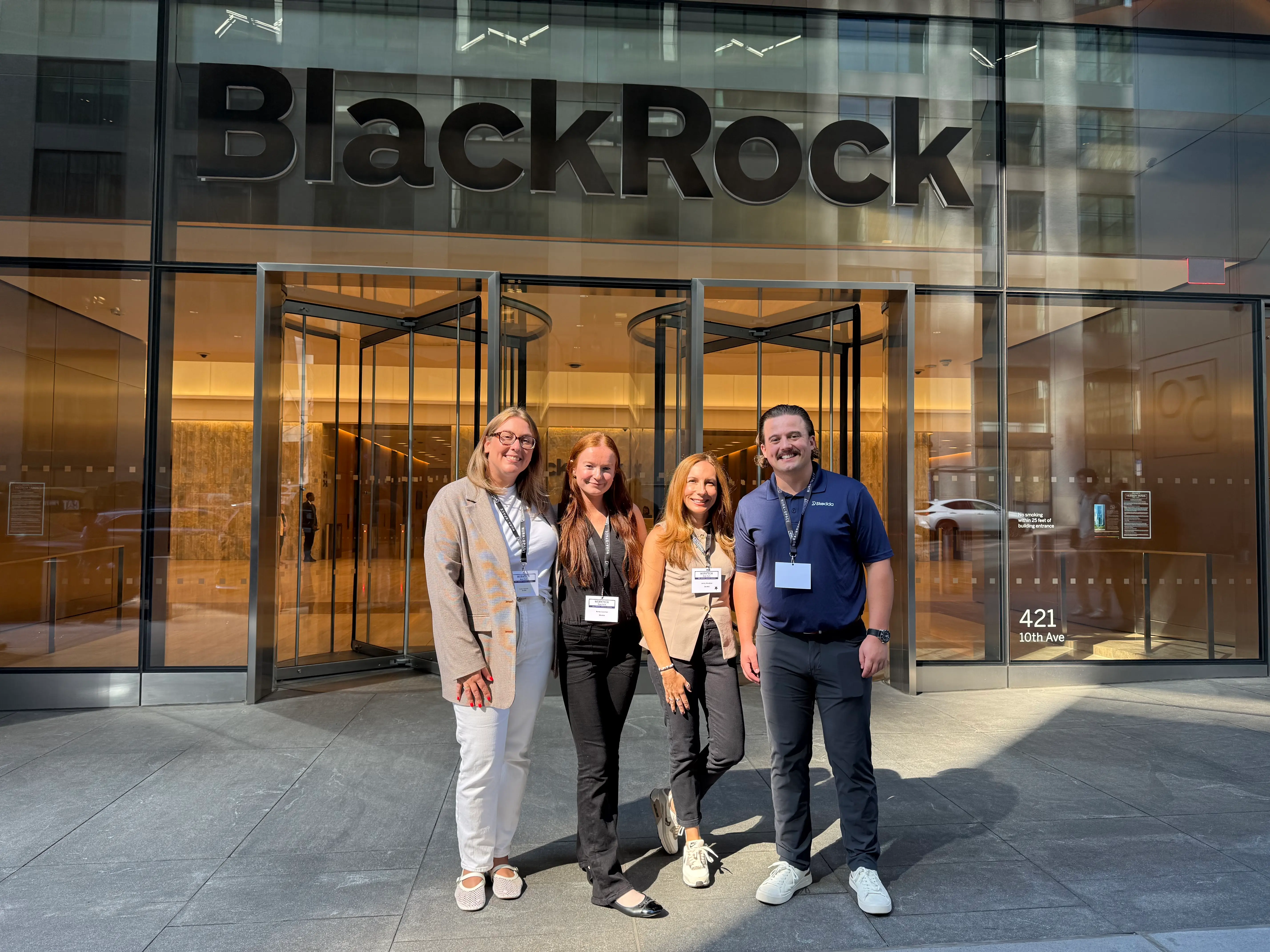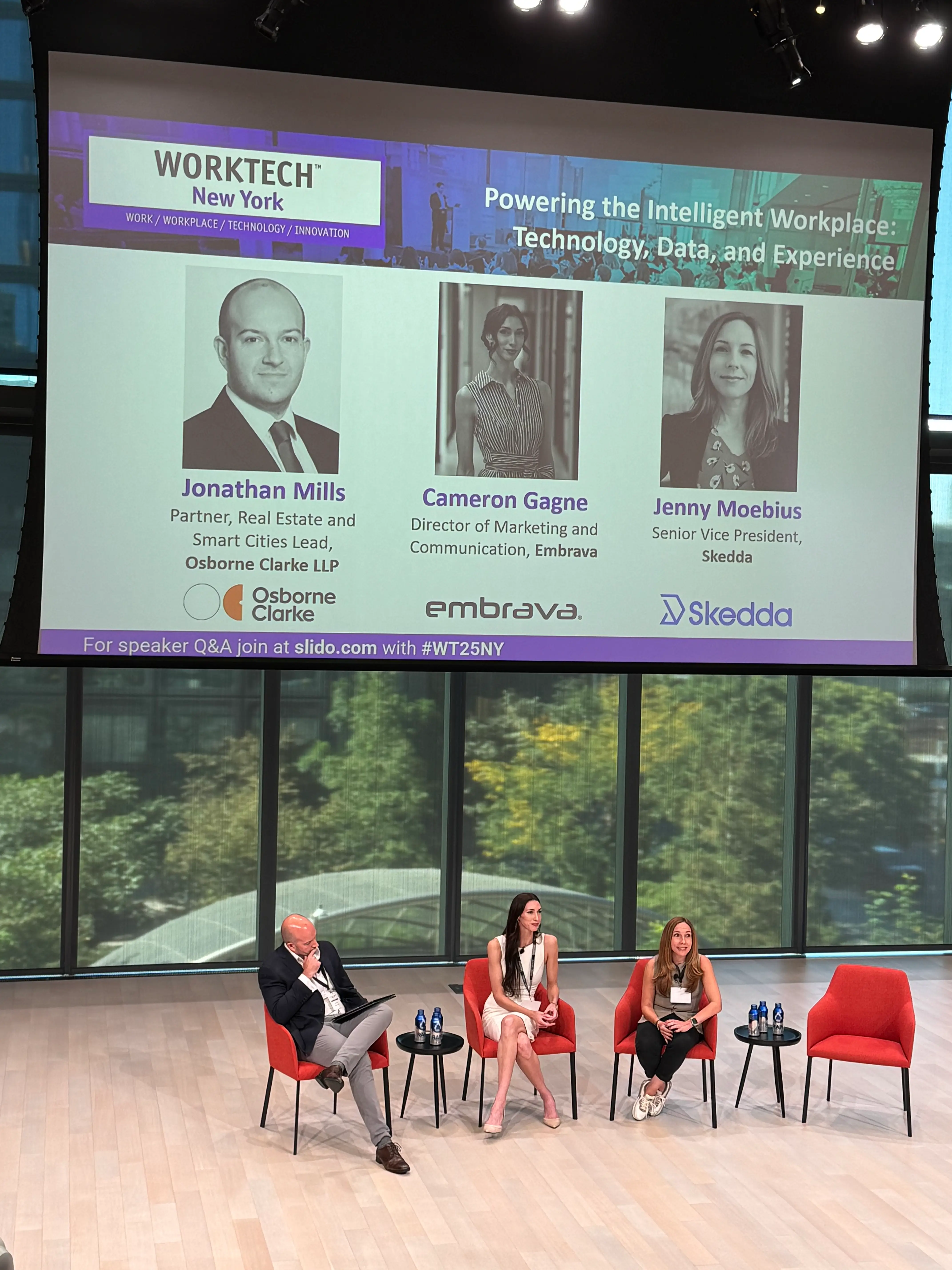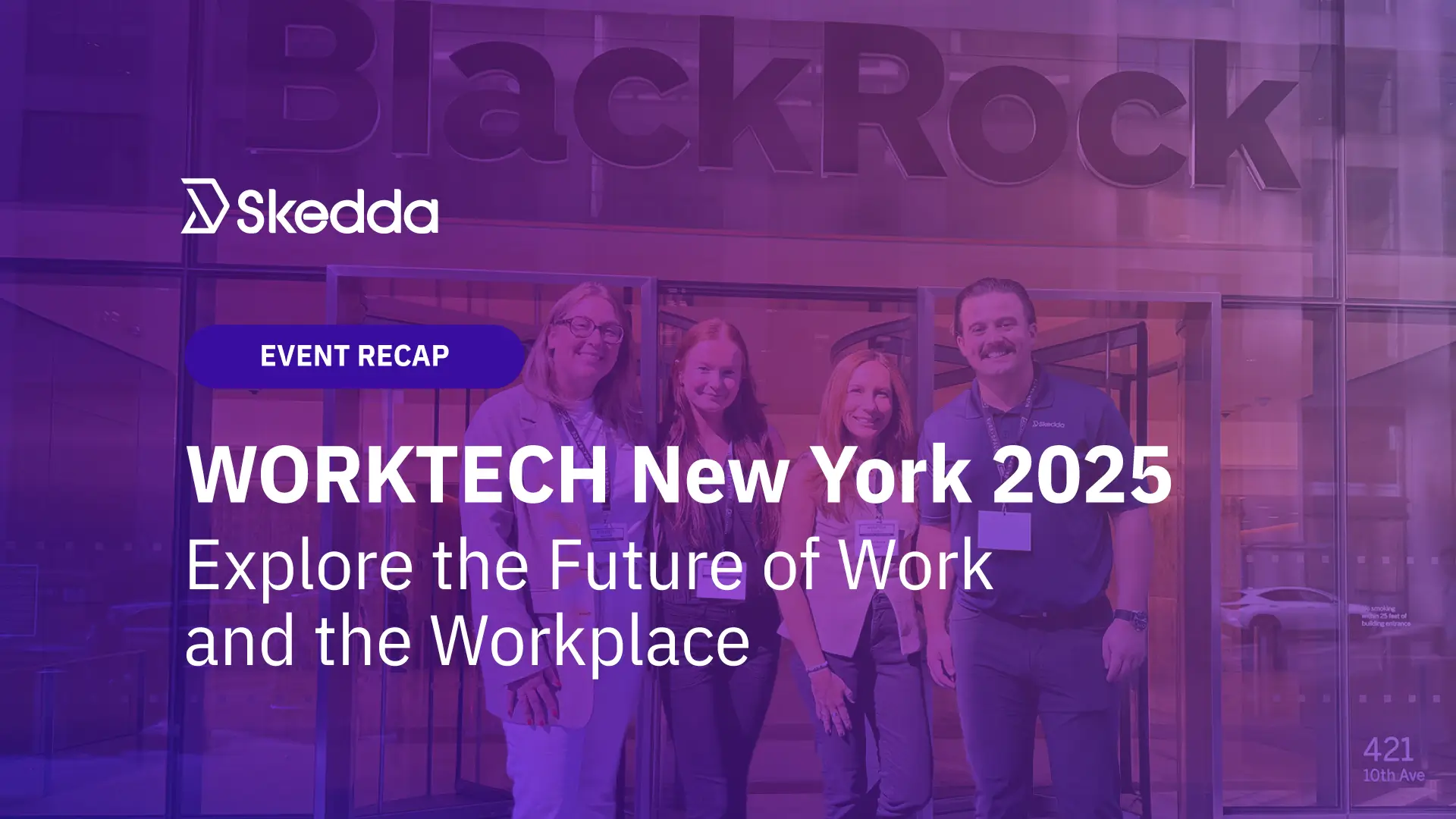
Cette semaine, Skedda a eu l'occasion de prendre la parole et d'exposer au WORKTECH New York 2025, organisé au siège social de BlackRock à Hudson Yards. L'événement a réuni des leaders des secteurs des installations, de l'immobilier, de la stratégie de l'environnement de travail, de la technologie et du design pour explorer les prochaines étapes pour l'avenir du travail et du lieu de travail.

Skedda SVP Jenny Moebius a rejoint le panel de la scène principale « Favoriser l'environnement de travail intelligent : technologie, données et expérience », aux côtés de Cameron Gagné (Embrava) et modérateur Jonathan Mills (Osborne Clarke LLP). La discussion a permis de découvrir les réalités du travail moderne d'aujourd'hui et la manière dont les organisations peuvent utiliser les données et la technologie pour créer des lieux de travail plus intelligents et plus centrés sur l'humain.
Repenser l'utilisation du lieu de travail
L'un des plus grands mythes sur le lieu de travail à l'heure actuelle ? Que tout le monde soit de retour au bureau cinq jours par semaine. La réalité est bien plus nuancée.
Jenny a partagé la réalité selon laquelle 70 % des organisations aux États-Unis fonctionnent avec des modèles hybrides flexibles et structurés (Flex Index), et Cameron a indiqué que les taux d'utilisation étaient en fait en hausse — avec une moyenne de 53 % en 2025, contre 38 % l'année précédente (données CBRE). Même avant la pandémie, le taux d'utilisation dépassait rarement 65 %. Ce changement met en évidence le fait que pendant que les employés rentrent, ils utilisent le bureau différemment plus qu'auparavant.

De « Me Space » à « We Space »
Cameron a également indiqué que la conception et l'objectif des bureaux sont en train de subir un profond changement. Individuel »espaces pour moi» — les bureaux et les sièges assignés — cèdent la place à »espaces», conçu pour la collaboration, la créativité et la connexion.
Elle a souligné que l'espace collaboratif a doublé au cours des quatre dernières années, reflétant un changement majeur dans la façon dont les gens veulent travailler. Les employés sont de plus en plus disposés à échangez votre espace personnel contre des expériences partagées, en valorisant les environnements qui les aident à mieux travailler ensemble. Le bureau, a-t-elle noté, est passé d'une exigence quotidienne à une avantage flexible — un programme qui favorise les moments significatifs en personne et les liens d'équipe.
Création de politiques qui correspondent aux résultats souhaités
Jenny a noté que même si le nombre moyen de jours d'assurance requis avait augmenté de 10 % l'année dernière, l'utilisation réelle des bureaux n'avait augmenté que de 2 à 3 %. Une politique n'est pas une question de conformité.
L'un des principaux thèmes de la conversation était l'importance de l'intentionnalité. Comme l'a fait remarquer Cameron, « vous devez créer une politique pour obtenir les résultats que vous souhaitez réellement ».
Si l'objectif est la collaboration, le mandat doit en tenir compte, par exemple en établissant un jour de l'ancre chaque semaine pour créer des liens avec l'équipe ou limitation des appels vidéo lorsque des personnes sont sur place. L'accent doit être mis sur les résultats et non sur les apparences.
Le succès de l'hybride dépend également de décisions fondées sur les données. Lorsque les entreprises peuvent montrer à leurs employés les données qui sous-tendent les politiques, y compris les modèles d'utilisation et les indicateurs de productivité, elles sont plus susceptibles de constater une adhésion et un changement de comportement.
Le retour sur investissement de la technologie de gestion de l'espace
Jenny a également partagé la réalité sur le terrain : des études de cas réelles sur la manière dont les clients utilisaient les données d'utilisation et d'occupation pour obtenir leur adhésion pour :
- Dimensionnement de leur empreinte (parfois réduction des effectifs, parfois expansion)
- Justifier les dépenses pour augmenter les ressources (lorsque des équipements tels que les superordinateurs sont toujours réservés et utilisés)
- Ajustements du système CVC (économies de millions de dollars dans certains cas)
Elle a parlé du coût des espaces vides et des conséquences de la surréservation et de l'indisponibilité des ressources, qui ont toutes deux un impact sur l'expérience des employés. Disposer des bonnes données aide les entreprises à concevoir des espaces et des expériences qui retiennent les meilleurs employés, une priorité dans l'économie actuelle.
La prochaine génération a besoin de mentorat et d'interaction humaine
Le panel a également abordé l'impact du travail hybride sur jeunes générations, en particulier les employés de la génération Alpha et de la génération Z. Sans une exposition régulière à la collaboration en personne, beaucoup passent à côté de précieux moments de mentorat, à savoir les interactions humaines spontanées qui enseignent « comment les choses se font ».
Les organisations qui conçoivent des expériences de bureau intentionnelles ont la possibilité de combler cet écart en combinant flexibilité et le lien humain qui alimente la croissance et l'apprentissage.
L'espace de travail intelligent est arrivé
Le point à retenir de WORKTECH New York était clair : l'environnement de travail intelligent est un environnement de travail qui concilie flexibilité et intentionnalité, utilise les données pour éclairer la conception et les politiques, et place l'expérience des employés au cœur de ses préoccupations.
Chez Skedda, nous sommes fiers d'aider les organisations à naviguer dans ce nouveau monde du travail en créant des espaces qui permettent aux équipes de se connecter, de collaborer et de s'épanouir.



.svg)
